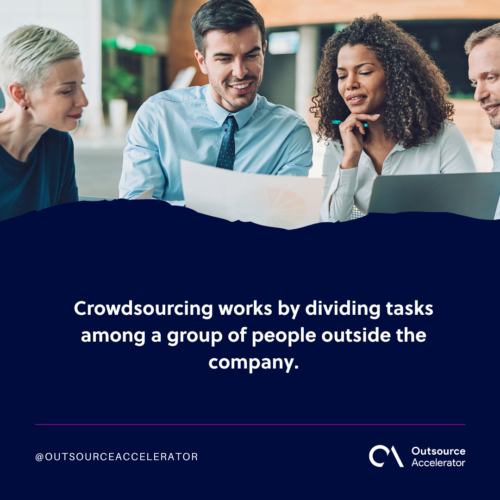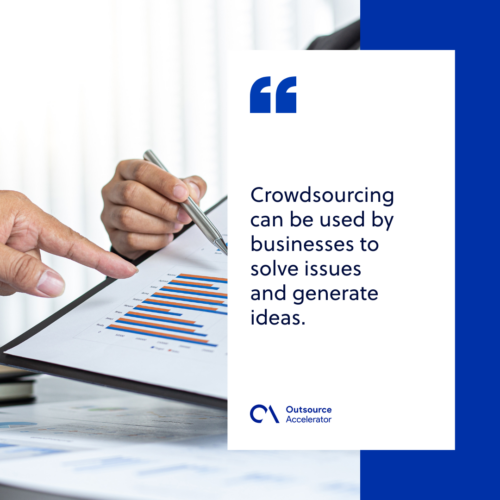Crowdsourcing
Definition
What is crowdsourcing?
Crowdsourcing is the process of gathering information for a project or activity by engaging the services of a large number of individuals, generally over social media platforms and mobile apps.
It enables firms to outsource work to professionals located anywhere. Further, crowdsourcing taps into a wide range of talents and knowledge without the overhead expenses associated with in-house staff.
How does crowdsourcing work?
Crowdsourcing works by dividing tasks among a group of people outside the company. It is used by certain businesses to achieve particular goals or to develop ideas in the company.
Unlike traditional outsourcing, where firms select a single contractor or freelancer for a task, the work is distributed to a broad, undefined population in crowdsourcing. The participants in these groups have no relationship to each other or the firm.

Where can crowdsourcing be applied?
Crowdsourcing affects many aspects of social and corporate relationships. It influences how businesses operate, develop products and services, and advertise their brand.
Some of the most popular companies that utilize crowdsourcing are scattered across industries: Waze for navigation, Starbucks for F&B, and Samsung for tech, among others.
Nonprofits and community organizations with limited finances also utilize crowdsourcing to promote their mission or create work. Moreover, this strategy has the potential to democratize problem-solving and promote innovation in research and healthcare.
It has the ability to transform the system through education, much as crowdfunding is presently challenging established banking and investment methods.
How to use crowdsourcing to grow your business?
Here are the various ways to utilize crowdsourcing in growing your business.
Investments
Crowdfunding for small businesses is becoming a popular way to acquire funds for business expansion, specific activities, and putting goods or services into the market.
Crowdsourcing can be used as an alternative funding option for your business.
Ideas
You can utilize unpaid or compensated crowdsourcing to gather ideas from consumers. Crowdsourcing may be used to gather suggestions for future offers, adjustments to existing offerings, features, and content.
You may use this strategy to get information from people about your organization and then utilize these suggestions to enhance business. Depending on how you crowdsource, it may be a great move for the firm.
Data
Many firms use crowdsourcing to get data from customers such as client profiles, such as demographics, and interests.
You can utilize this data to develop your marketing plan, fine-tune your market research, and engage with customers. You may also get information from consumers regarding your offers, upgrades, and features.
Talent
While many individuals use crowdsourcing to gain ideas for a one-time project, certain firms may use it to attract opportunities.
You may bring people on for a one-time assignment to assess their talents and see whether they would be a suitable match for your organization.
Problem-solving
Crowdsourcing can be used by businesses to solve issues and generate ideas. For problems that require certain knowledge or skills, crowdsourcing offers access to more diverse ideas and solutions out of the box.
A business can have a deeper understanding of certain issues by crowdsourcing from people that have firsthand experience or are directly affected by them.

Benefits of crowdsourcing
Here are the various benefits of crowdsourcing.
Improves scalability
Scaling is a challenging way for an organization to handle, especially when working on large projects with few resources. Crowdsourcing offers a solution to this.
With the flexibility and extent of reach that crowdsourcing offers, it’s possible to farm out microtasks to workers from different locations.
Reduces knowledge gaps
Most businesses, unless they operate on a huge scale, do not have all of the resources they require at any given moment.
Crowdsourcing allows access to people with skill sets that are not available within the firm. This may be extremely useful for projects or challenges that need specific knowledge or skill sets that are in short supply.
Lowers operational costs
Businesses may avoid most of the costs involved with operations when a group of individuals collaborates digitally to execute a task. Depending on the tasks at hand, shorter turnaround times might mean more earnings.
Enhances customer engagement
Allowing customers to be part of crowdsourcing activities may enhance a company’s customer engagement. It may also be used to complement marketing efforts.
But most importantly, as users, your customers have a better understanding of how your products or services work, so enlisting their help in crowdsourcing can help solve specific problems more effectively.
Crowdsourcing vs. crowdfunding
Crowdfunding is a type of crowdsourcing in which individuals make contributions to get an idea into production. As the name suggests, crowdfunding involves voluntary monetary donations, which would then be used to finance the business concept.
In contrast, most forms of crowdsourcing are focused on the gathering and consolidation of ideas and skills from groups of people. There are no donations involved, and in some cases, crowdsourcing businesses may also compensate paid freelancers.







 Independent
Independent




